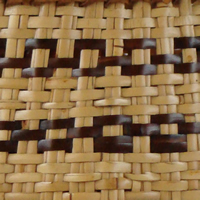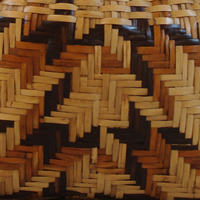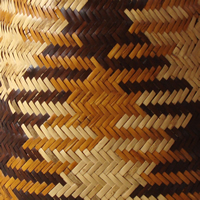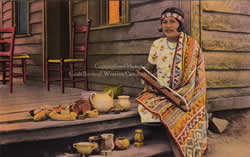Lesson Plans:
Basket Designs:
A Lesson in Math
Subject(s)/Grade(s): Math Grades 4 and 5 (based on 4th grade NC Objectives)
Related Subject(s): Cultural connection: Art and History of basket-making (Craft Revival Project)
Learning Outcomes
By viewing traditional Cherokee basket designs and creating unique designs, students will incorporate various math concepts including visual imagery, pattern, and spatial reasoning. After finishing "basket pattern," student will calculate fractional, decimal and percentile amounts.
- The learner will recognize Cherokee baskets designs.
- The learner will create a unique basket design incorporating patterns, symmetry, and spatial reasoning.
- The learner will apply concepts of fractions, decimals, and percentages based on their basket designs.
Teacher Planning
- Time required for lesson: Allow two 50-minute class periods to complete this lesson.
- Teacher preparation involves gathering materials needed to supplement lesson.
Included are:
- Traditional Cherokee basket designs - https://www.wcu.edu/library/DigitalCollections/CherokeeTraditions/ArtsAndCrafts/pattern-index/index.html
- Student sample design
Materials/Resources
- Pictures of Cherokee basket designs
- Graph paper
- Colored pencils (to represent various basket dyes)

Chain pattern |

Diagonal pattern |

Flowing water pattern |
Procedures
Cherokee culture is rich in basketry. There are several known designs woven into the baskets. Patterns woven into baskets are generally continuous and symmetric. Baskets are made from white oak and honeysuckle. Various natural materials are used to dye white oak. Black walnut is used to make a dark brown color. Butternut bark makes a black color. Bloodroot produces a rusty orange color and yellow root provides a golden yellow color.
Activity:
- View various Cherokee basket designs. https://www.wcu.edu/library/DigitalCollections/CherokeeTraditions/ArtsAndCrafts/pattern-index/index.html
- Discuss elements of symmetry, pattern, and color
- Mark off a 10" x 10" square grid on graph paper.
- Create a colored pattern design using 2-5 colors.
- Mark off a 20" x 20" square grid on graph paper.
- Repeat design on 10" x 10" grid four times onto the 20" x 20" grid (see attachment 1).
- After design is completed, have students count the number of squares of each color used on the 10" x 10" grid (total should add up to 100).
- After determining the number of squares of each color used, students can represent the number in fraction, decimal, and percentage forms. (ex. 28 squares are bloodroot color, the fraction 28\100, the decimal is .28, and the percentage is 28%).
- Display and share.
Assessment
- End product graded then displayed
- Conference about symmetrical pattern, use of color, and originality of name
North Carolina Curriculum Alignment
Math (2003)
Current K-8 - Grade 4
Sources
- Hill, Sarah. Weaving New Worlds: Southeastern Cherokee Women and their Basketry. Chapel Hill: University of North Carolina Press, 1997.
- Sommer, Robin. Native American Art. New York: Brompton Books Corp., 1994.
- Craft Revival: Shaping Western North Carolina Past and Present craftrevival.wcu.edu
- Craft Revival: Shaping Western North Carolina Past and Present - Basket Pattern Index https://www.wcu.edu/library/DigitalCollections/CherokeeTraditions/ArtsAndCrafts/pattern-index/index.html
- Museum of the Cherokee Indian www.cherokeemuseum.org/
- Cherokee basket design cards by Shan Goshorn; available for purchase at shangoshorn@yahoo.com
- Submitted by Donna Beck and Jonnie Walkingstick, Cherokee Elementary School, Cherokee, NC 28719




